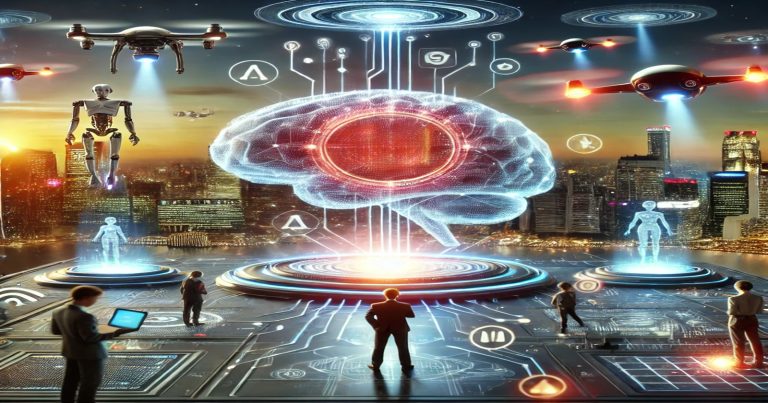Artificial intelligence future describes the expected developments, applications, and challenges. As technology advances, AI becomes more and more powerful, with the result that it can affect our daily lives, work and ways of communicating. From self-driving cars to AI physicians, the future of AI offers great invention but also some worries about security and control. Knowing AI’s history, influence, and risk requirements allows people to be ready for what they face in this fast-changing digital world.
What is Artificial Intelligence?
Artificial intelligence is what makes machines intelligent. AI solves problems, gives a speech, plays the game, etc. It copies how humans think. AI covers a lot of ground, including learning, planning, natural language processing, and vision. learning, problem-solving, understanding language, recognizing images, decision making and so on. Algorithms and data make AI imitate thinking and behavior.
AI is made up of many specialized fields of computer science, including machine learning, deep learning, natural language processing and computer vision. With these technologies, machines can learn from data alone; they get better over time without needing to be explicitly programmed for each new case of why they should do anything some way or another. This flexibility means that AI is a useful tool in fields such as healthcare, commerce, education and transportation.
The Evolution of AI
The aim of artificial intelligence research in the 1950s was to make computers as intelligent as humans. Earlier systems were rule-based, following rules created by programmers. They had no capacity to learn or to adapt. Researchers believed that machines would soon match human thought, but were delayed by bad data and weak computing power.
Rise of Machine Learning
The introduction of machine learning in the 1990s and 2000s gave AI a big growth spurt, allowing systems to learn from data instead of just obeying rules. Decision trees algorithms, neural networks, and support vector machines all became hot. Thanks to the large amount of data being produced bythe internet, machine learning became much more effective.
Deep Learning and Modern AI
In 2012, deep learning brought another great leap forward for AI capabilities. These models use neural networks with many layers to process complex data such as images and speech. Tools like Google’s Translation Service, Apple’s Siri, and ChatGPT can “understand” deep learning in order that they recognize and respond intelligently. This is a significant turning point in the journey of AI. There were breakthroughs in areas like robotics, automation and voice assistants.
Artificial Intelligence Future
The future of artificial intelligence is fast and bright. Artificial intelligence will affect the way we live, the shape of industries and jobs. It will make systems more intelligent, tasks lighter, and decisions swifter. By implication, here’s what can be expected in the next few years.
AI in Everyday Life
In the near future artificial intelligence will pervade our daily lives even more greatly. We’ll have smarter virtual assistants, more intelligent houseware, apps that know our habits. AI will provide personalized digital content according to user behavior. In addition, customer service is more efficient through chat as well as phone calls. AI will simplify and streamline common tasks — whether setting reminders or turning on smart appliances.
AI in Industries
AI will change industry after industry. That will enable doctors to diagnose disease sooner, to present them with treatment options personalized for their conditions. In education, AI tutors will give students learning systems which are customized for the individual. Finance industries use AI to ensure there is no fraud or in the sudden increase in demand. Real-time transactions are also managed through it as well. Retail businesses use AI to track customer behavior and recommend products. All industries will employ AI for greater accuracy, speed or customer satisfaction–thus raising efficiency and productivity across the board.
Future of AI Examples in Technology
The future will be shaped by AI-driven technologies. Using AI to analyze traffic and avoid accidents, automobiles will not need drivers. In health care, perhaps robots will help surgeons perform difficult operations or AI software will allow diagnoses to be made more quickly. In smart cities, AI applications will facilitate the smooth management of traffic, electricity and garbage disposal. Agricultural surveys may take place from the air AI powered drones and sensors tell farmers at a glance which parts of their fields need extra care.
AI and Human Jobs
AI will change the world of work. But this is not just a matter of job losses: old ones will go and new ones arise. Routine work may be automated, but there will always be demand for training and consultancy in fields such as ethics, AI law and robotics. Whether the worker will be let to take a new path or make a forced transformation will depend on them rebuilding their skill set and keeping up with the latest technology. Governments and companies need to invest in retraining programs. The future of work will involve humans and machines working side by diminution in near-performance mode.
Risks and Dangers of AI
Even though AI shows to help the promise of making lives easier, still a number of risks and problems must become carefully managed to ensure safe and responsible development.
Job Displacement and Economic Inequality
As AI and (industrial) automation grow, many menial and routine jobs will disappear especially in the fields of production, transportation and low-level office work. This will widen the gap between skilled and unskilled workers and increase inequality. Reskilling programs and policies to help casual laborers replace their work with AI-powered jobs have to be created by governments and businesses alike.
Privacy and Data Misuse
To work well, AI systems need lots of personal data. If there are no laws to protect people’s data, companies might destroy or sell it (a person’s own private information). This is an invasion of someone’s privacy. AI systems should be open and stable, and should always use appropriate data privacy rules to protect their users.
Bias and Discrimination
A If the AI system is trained on biased data then the AI can end up making unfair decisions. A system like this, for instance, in hiring or lending, could bias towards certain groups. This type of discrimination seriously harms society. To the extent that systems are tested and treated on their own merits, without any potential bias or prejudice, that would help in efforts to stop this.
Lack of Human Control
Another big concern about AI is its potential to behave oddly, in uncontrollable ways, even in sectors such as healthcare, defence and finance. If humans surrender control, the outcome could be disastrous. Therefore we must create AI which is always safe and comprehensible – and which allows human beings to still hold power whenever necessary.
Ethical and Moral Issues
AI is a matter of deep ethics. It can machines be allowed to decide whether people live or die, such as in self-driving cars or medical operations? When AI makes a mistake, who should be responsible? We must create clear laws and moral guidelines for this. Then AI is sure to benefit most of the population, not merely a few large companies.
Relevance to ACCA Syllabus
ACCA’s Strategic Business Leader (SBL) and Advanced Performance Management (APM) papers display such digital applications definitely. AI tools support better decisions, audits done at a distance, risk analysis and now in real time from financial accounts. ACCA professionals need to appreciate how AI will reconfigure professional functions and make greater use of data analytics; the new role for them to play may be as an ethics judge in AI-powered environments.
Artificial Intelligence Future ACCA Questions
Q1: What role does AI play in audit procedures in the ACCA profession?
A) By randomly sampling data
B) By improving the human ledger entries
C) With big data analysis for anomalies
D) Audit documentation replacement
Ans: C) Through analyzing large data sets for anomalies
Q2: How do AI tools assist with decision-making in performance management?
A) Tuna fish bait set aside financial ratios
B) By providing real-time performance insights
C) By changing tax rules
D) By taking legal contracts
Ans: B) Creating real-time performance insights
Q3: In which area of financial reporting do you see AI automation as having the most benefit?
A) Manual transaction input
B) Forecasting future cash flows
C) Writing IFRS standards
D) Management of physical inventory
Ans: B) = predicting future cash flows
Q4: What ACCA exam paper correlates best with learning about AI use in governance and controls?
A) STRATEGIC BUSINESS REPORTING
B) Financial Management
C) Strategic Business Leader
D) Taxation
Ans: C) Strategic Business Leader
Q5: What is one danger of using AI tools in audit without the proper human eyes on them?
A) automatic audit judgment
Q) A) Excessive reliance on judgmental sampling
Missed errors are due to algorithm bias
D) Decrease in the speed of report generation
Ans: C) Errors missed because of the bias in the algorithm
Relevance to US CMA Syllabus
In the US CMA syllabus, AI is combined with Strategic Planning, Performance Management and Risk management. Future AI applications in the realm of finance will assist in such things as predictive budgeting, dynamic forecasting, and automatical variance analysis. CMAs need to get ready for AI’s output–analyzing it and incorporating this into strategic and operational decisions.
Artificial Intelligence Future CMA Questions
Q1: How is AI enhancing internal controls on cost?
A) By replacing accountants
B) Through auto-generating ethics report
C) Identifying atypical transactions in real-time
D) By removing the need to budget
Ans: C) Real-time identification of unusual transactions
Q2: How can AI be beneficial in the performance management process for CMAs?
A) Cuts back on dashboards
B) Measures variation and predicts results more quickly
C) Only encourages manual data entry
D) Impedes flexibility in strategic planning
Ans: B) Traces variance and predicts results quicker
Q3: Which CMA topic applies AI in the assessment of capital budgeting?
A) Audit Standards
B) Internal Controls
C) Investment Decisions
D) Ethics and Regulations
Ans: C) Investment Decisions
Q4: [Judging] Which AI function best assists with CMA decision analysis?
A) Bots for emails, Robotic Process Automation
B) What-if scenarios with predictive analytics
C) Social media monitoring
D) Generating legal contracts
Ans: B) Predictive analytics for what-if scenarios
Q5: What is the unique edge of AI in managerial reporting?
A) Use of handwritten reports
B) Delay in financial closing
Immediate insight from real-time dashboards C)
D) Elimination of ERP systems
Ans: C) Real-time dashboards and immediate visibility
Relevance to US CPA Syllabus
Within the AUD and BEC units of the CPA learning schedule AI fits.It’s an AI world and that means auditors need to change course, because all new tools show mechanical heuristics and unchanging figures until infinity can prove nothing.Pace yourself, as CPAs will get used to audits based on AI tools and develop strong professional judgement in environments where robots still have a lot to learn.
Artificial Intelligence Future CPA Questions
Q1: In what way is AI used for portfolio management?
A) By issuing stock dividends
B) By automating your asset allocation strategies
C) By preparing audit reports
D) By closing accounts books inappropriately
Ans: B) Through automated asset allocation strategies
Q2: Which investment analysis task would AI tools be of the most help for?
A) Reading paper financial statements
B) Predicting corporate credit ratings
C) Filing regulatory reports
D) Calculating VAT
Ans: B) Predict company credit ratings
Q3: What kind of AI technique is frequently used in risk modelling?
A) Regression of past data
B) Blockchain mining
C) Manual ledger review
D) Tax computation
Ans: A) Regression based on historical data
Q4: In ESG investing, what can AI offer to portfolio managers?
A) In total replacement of human judgment
B) Data tracking sustainability trends with big data
C) By restricting ethical investments
D) Lessening the report transparency
Ans: B) Tracking sustainability trends in big data
Q5: How do CFA professionals use AI for equity research?
A) To count shares manually
B) For automating earnings forecast models
C) For Tax Preparation files
D. To detect fraud in real-time
Ans: B) Automate earnings forecast models
Relevance to CFA Syllabus
The future of AI, therefore, is intricately woven into the CFA curriculum, particularly in Quantitative Methods, Portfolio Management, and Ethical & Professional Standards. AI assists in algorithmic trading, sentiment analysis, and real-time risk tracking. CFA exam candidates will need to grasp both the potential of AI and the concerns surrounding its limitations so that they can apply it ethically in roles like financial-modeling and investment advisory.
Artificial Intelligence Future CFA Questions
Q1: What role does artificial intelligence play in audit data analytics?
B) It writes the audit report on its own
B) It detects irregularities and patterns in transactions
C) It overlooks control deficiencies
D) It eliminates the need for documentation
Ans: B) It helps to identify patterns and anomalies in transactions
Q2: Of the CPA exam sections, which one has the closest connections to AI in helping them evaluate risks?
A) Regulation
B) Auditing and Attestation
C) Financial Accounting & Reporting
D) Business Environment & Concepts
Ans: B) Auditing and Attestation
Q3: How is AI, as a tool, utilized for compliance, especially regulatory?
A) Forecasting rainfall
B) Monitoring transactions for suspicious activity
C) Making legal judgments
D) Setting tax rates
Ans: B) Transactions for suspicious activity
Q4: What is one huge advantage of including AI in CPA audit workflows?
A) Less access to data
B) Delayed reports
C) Continuous auditing and real-time insight
D) Completely automated without any safeguards
Ans: C) Continuous auditing & real-time insights
Q5: Which emerging area is AI most appropriately studied in CPA examinations?
A) Tax return processing
B) information technology audit and data analytics
C) Bookkeeping
D) Payroll computation
Ans: B) IT audit and data analytics


